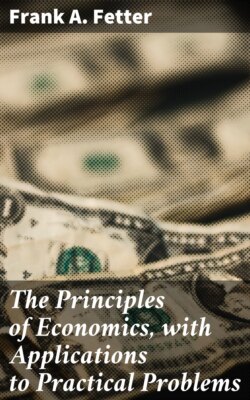Читать книгу The Principles of Economics, with Applications to Practical Problems - Frank A. Fetter - Страница 12
На сайте Литреса книга снята с продажи.
§ III. THE RELATION OF ECONOMICS TO PRACTICAL AFFAIRS
ОглавлениеEconomics is first a science
1. The ideal of political economy here set forth is that it should be a science, a search for truth, a systematized body of knowledge, arriving at a statement of the laws to which economic actions conform. It is not the advocacy of any particular policy or idea, but if it arrives at any conclusions, any truths, these cannot fail to affect the practical action of men.
But it touches many practical interests
Political economy, because defined as the science of wealth, has been described by some as a gospel of Mammon. It is hardly necessary to refute such a misconception. Political economy is not the science of wealth-getting for the individual. Its study is not primarily for the selfish ends and interest of the individual. (Certainly some of its lessons may be of practical value to men in active business) for many economic "principles" are but the general statement of those ideas that have been approved by the experience of business men, of statesmen, and of the masses of men. Some of its lessons must have educational value in practical business, for political economy is not dreamed out by the closet philosopher, but more and more it is the attempt to describe the interests and the action of the practical world in which men must live. Many men are working together to develop its study—those who collect statistics and facts bearing on all kinds of practical affairs, and those who search through the records of the past for illustrations of experiments and experiences that may help us in our life to-day.
Economic study needed in a democracy
2. But, in the main, the study of political economy is a social study for social ends and not a selfish study for individual advantage. The name political economy was first suggested in France when the government was monarchical and despotic in the extreme. As domestic economy indicates a set of rules or principles to guide wisely the action of the housekeeper or the owner of an estate, so political economy was first thought of as a set of rules or principles to guide the king and his counselors in the control of the state. The term has continued to bear something of that suggestion in it, though of late the term "economics," as being broader and less likely to be confused with politics, has very generally come into use. But in the degree in which unlimited monarchy has given way to the rule of the people, the conception of political economy has been modified. In a democracy there is need for a general diffusion of knowledge. The power now rests not with the king and a few counselors, but in the last resort with the people, and therefore the people must be acquainted with the experience of the past, must have all possible systematic knowledge to enlighten public policy and to guide legislation.
Is of growing interest and influence
Moreover, with the growth of the modern state, with the interest increasing importance of business, and of industrial and commercial interests, as compared with changes of dynasty or the personal rivalries of rulers, economic questions have grown in relative importance. In our own country, particularly since the subjects of slavery and of States' rights ceased to absorb the attention of our people, economic questions have pushed rapidly into the foreground. Indeed, it has of late been more clearly seen that many of the older political questions, such as the American Revolution and slavery, formerly discussed almost entirely in their political and constitutional aspects, were at bottom questions of economic rivalry and of economic welfare. The remarkable increase in the attention given to this study in colleges and universities in the last twenty years is but the index of the greatly increased interest and attention felt in it by citizens generally.
To sum up, it may be said that in the study of political economy we are seeking the reason, connection, and relations in the great multitude of acts arising out of the dependence of desires on the world of things and men.
